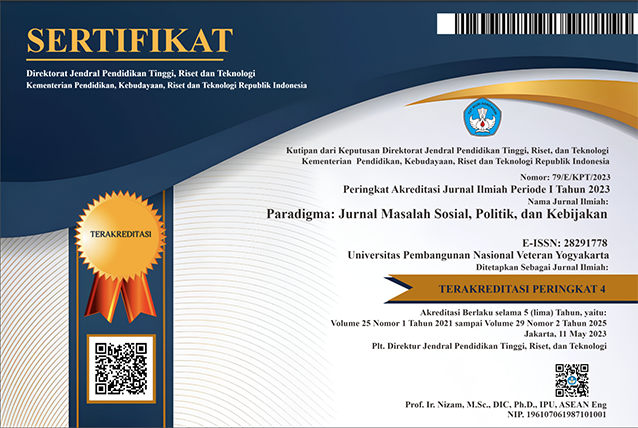Alasan-alasan Penolakan Pengunduran Diri Pemerintah Bashar Al-Assad terhadap Tuntutan Oposisi dalam Gerakan Reformasi Suriah
DOI:
https://doi.org/10.31315/paradigma.v16i2.2465Keywords:
People Power, Intervention, Constitutional, LegitimacyAbstract
Syria is among the Arab states affected by the storm of revolution. Syrian political conflicts are not purely due to internal problems in the country, but Syrian political conflict is a scenario that has been designed for the United States and its Allies topple Bashar al-Assad’s government. People Power is generally driven by the political consciousness of a country’s domestic problems, but the ongoing conflict in Syria is the demands made by the opposition is driven from the outside. The existence of power from the outside to intervene in Syria that sparked opposition to demand the president to immediately step down from the chairmanship.
President Bashar al-Assad has the authority under the constitution. Based on the inherent authority of the constitution and the constitution of Syria, Bashar al-Assad has the authority to resolve the conflict in Syria. By legitimacy, Bashar al-Assad has the authority to stay in power because of the support of its people. A president could not have done anything without the institutions efforts and support of all the people. Besides large countries such as Russia, China and Iran plays an important role in the rejection of the resignation of Bashar al-Assad to the demands of the Syrian opposition.
Downloads
Published
How to Cite
Issue
Section
License
The manuscript submitted to Paradigma: Jurnal Masalah Sosial, Politik, dan Kebijakan journals are released under the license of Creative Commons Attribution-Non Commercial- ShareAlike (CC BY SA) if and when the article is accepted for publication.
We declare that:
- This paper has not been published in the same form elsewhere.
- It will not be submitted anywhere else for publication prior to acceptance/rejection by this Journal.
- A copyright permission is obtained for materials published elsewhere and which require this permission for reproduction.
Retained Rights/Terms and Conditions
Authors retain all proprietary rights to the published works, such as (but not limited to) the following rights:
- Copyright and other proprietary rights relating to the article, such as patent rights,
- The right to use the substance of the article in own future works, including lectures and books,
- The right to reproduce the article for own purposes,
- The right to self-archive the article
The right to enter into separate, additional contractual arrangements for the non-exclusive distribution of the article's published version (e.g., post it to an institutional repository or publish it in a book), with an acknowledgment of its initial publication in this journal Paradigma: Jurnal Masalah Sosial, Politik, dan Kebijakan



